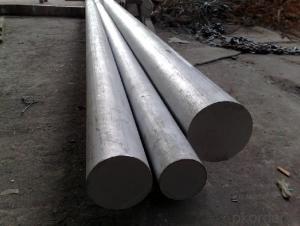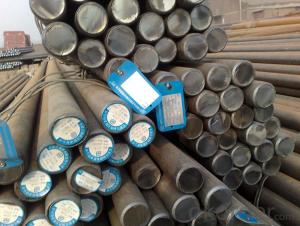Alloy Steel 100cr6/52100/GCr15/SUJ2 Bearing Steel
- Loading Port:
- China main port
- Payment Terms:
- TT OR LC
- Min Order Qty:
- 25 m.t.
- Supply Capability:
- 10000 m.t./month
OKorder Service Pledge
OKorder Financial Service
You Might Also Like
Item specifice
The details of our Steel
1. Produce Standard: as the GB, AISI, ASTM, SAE, EN, BS, DIN, JIS Industry Standard
2. Produce processes: Smelt Iron -EAF smelt Billet - ESR smelt Billet -Hot rolled or forged get the steel round bar and plate
3. Heat treatment:
Normalized / Annealed / Quenched+Tempered
4. Quality assurance:
All order we can received Third party inspection, You can let SGS, BV,.. and others test company test and inspect our products before Goods shipping.
Product information
Chemical Composition(GB)%
C | Si | Mn | Cr | Cu | S |
0.95-1.05 | 0.15-0.35 | 0.25-0.45 | 1.4-1.65 | ≤0.20 | ≤0.020 |
Heat Treatment
Item | Temperature ℃ | Hardness |
Anneal | 790-810 | 170-207HB |
Quenching | 830-860 | 62-66HRC |
Tempering | 150-180 | 61-66HRC |
Characterstics
1.Uniform hardness,Good abrasion resistance |
2.High contact fatigue resistance |
3.Cutting performance in general |
Applications: Used to make the load of the larger small cross-section conditioning and stress smaller large parts
Product show

Workshop show

- Q:What are the main applications of special steel in the chemical processing industry?
- Special steel is widely used in the chemical processing industry due to its unique properties and capabilities. Some of the main applications of special steel in this industry include the manufacturing of storage tanks, pipelines, and reactors. Special steel is resistant to corrosion, high temperatures, and chemical reactions, making it ideal for handling and storing various chemicals and substances. Additionally, special steel is also utilized in the construction of equipment used in the separation, purification, and filtration processes in chemical plants. Overall, the main applications of special steel in the chemical processing industry revolve around its durability, resistance to corrosion, and ability to withstand harsh chemical environments.
- Q:What are the main factors that determine the cost of special steel?
- The main factors that determine the cost of special steel include the raw material costs, production techniques and processes involved, the complexity of the steel's composition, the level of customization required, and market demand and supply dynamics.
- Q:What are the different renewable energy grades of special steel?
- There are different grades of special steel used in the production of renewable energy equipment, such as wind turbines, solar panels, and hydroelectric generators. These grades include high-strength steel, corrosion-resistant steel, and heat-resistant steel. Each grade is specifically designed to withstand the unique operating conditions and environmental factors associated with renewable energy applications.
- Q:How does special steel contribute to the manufacturing of turbine blades?
- Special steel plays a crucial role in the manufacturing of turbine blades due to its unique properties and characteristics. Turbine blades are subjected to extreme conditions, such as high temperatures, high rotational speeds, and constant exposure to air and steam. These demanding operating conditions require materials that can withstand such harsh environments while maintaining their structural integrity and performance. Special steel, also known as superalloys, possesses a combination of exceptional mechanical properties, heat resistance, and corrosion resistance, making it an ideal choice for turbine blade manufacturing. The high temperature resistance of special steel allows turbine blades to operate efficiently at elevated temperatures without significant deformation or failure. One of the key properties of special steel is its ability to retain strength and hardness even at high temperatures. This characteristic is crucial for turbine blades as they are constantly exposed to hot gases and steam in power generation applications. Special steel's resistance to creep, a phenomenon where materials deform under prolonged exposure to high temperatures and mechanical stress, ensures that turbine blades maintain their shape and structural integrity over time. Moreover, special steel exhibits excellent corrosion resistance, protecting turbine blades from oxidation and other forms of degradation caused by the aggressive operating environment. This corrosion resistance is particularly important in gas turbines, as the combustion process produces corrosive gases and particles that can damage the blades. Special steel's ability to resist oxidation and corrosion ensures the longevity and reliability of turbine blades. Additionally, special steel offers high strength-to-weight ratios, enabling the design and manufacture of lightweight turbine blades. This lightweight characteristic allows for improved aerodynamic performance and reduced energy consumption, as the turbine blades require less force to rotate at high speeds. In summary, special steel significantly contributes to the manufacturing of turbine blades by providing exceptional mechanical properties, heat resistance, corrosion resistance, and lightweight characteristics. These properties ensure that turbine blades can withstand the extreme conditions of power generation applications, ultimately enhancing their performance, longevity, and overall efficiency.
- Q:How does sulfur affect the machinability of special steel?
- Special steel can be affected by sulfur in both positive and negative ways. On one hand, when a small amount of sulfur is added, it acts as a free-machining element. This leads to the formation of sulfide inclusions, which aid in breaking chips during machining. As a result, the surface finish is improved, tool wear is reduced, and cutting speeds are increased. This is particularly advantageous for high-speed machining operations. On the other hand, excessive sulfur content can be detrimental to machinability. When sulfur levels are high, brittle sulfide inclusions are formed, leading to poor machinability and decreased mechanical properties. This can cause increased tool wear, inferior surface finish, and slower cutting speeds. Additionally, sulfur can contribute to the development of built-up edge, further hindering the machinability of special steel. Therefore, maintaining an optimal sulfur content is crucial in order to achieve a balance between improved machinability and the desired mechanical properties. Proper control of sulfur levels in the steel composition, along with the use of appropriate machining techniques and tool selection, is necessary to achieve efficient and high-quality machining of special steel.
- Q:How does the microstructure of special steel affect its performance?
- The microstructure of special steel plays a crucial role in determining its performance. It influences various mechanical properties such as strength, hardness, toughness, and wear resistance. By controlling the arrangement and size of the steel's grains, as well as the presence of any additional phases, manufacturers can tailor the material to meet specific requirements. For instance, a finer grain structure can enhance strength and hardness, while a uniform distribution of carbides can improve wear resistance. Consequently, optimizing the microstructure allows special steel to exhibit superior performance characteristics in specific applications.
- Q:What are the applications of special steel in the power generation supply chain?
- Special steel plays a crucial role in the power generation supply chain, specifically in applications where high strength, corrosion resistance, and temperature resistance are required. It is extensively used in the construction of power plant components such as boilers, turbines, and generators, as well as transmission lines and distribution systems. Special steel ensures the reliability and efficiency of power generation equipment, enabling it to withstand harsh operating conditions and maintain long-term performance.
- Q:Can special steel be used for tooling applications?
- Yes, special steel can be used for tooling applications. Special steel, such as high-speed steel or tool steel, is specifically designed to have superior hardness, wear resistance, and toughness, making it highly suitable for tooling applications where durability and precision are crucial.
- Q:What are the different production methods for special steel?
- There are several production methods for special steel, including electric arc furnace (EAF), basic oxygen furnace (BOF), and vacuum arc remelting (VAR). Each method has its own advantages and is used depending on the specific requirements of the steel being produced. EAF is commonly used for recycling scrap steel and allows for flexibility in alloy composition. BOF is more suitable for large-scale production and is known for its efficiency in removing impurities. VAR is a specialized method used to refine and purify steel, resulting in high-quality, homogeneous products.
- Q:What are the different additive manufacturing grades of special steel?
- There are several different additive manufacturing grades of special steel, including maraging steel, tool steel, stainless steel, and high-speed steel. These grades are specifically designed for additive manufacturing processes, offering enhanced properties such as high strength, corrosion resistance, and wear resistance.
1. Manufacturer Overview |
|
|---|---|
| Location | |
| Year Established | |
| Annual Output Value | |
| Main Markets | |
| Company Certifications | |
2. Manufacturer Certificates |
|
|---|---|
| a) Certification Name | |
| Range | |
| Reference | |
| Validity Period | |
3. Manufacturer Capability |
|
|---|---|
| a)Trade Capacity | |
| Nearest Port | |
| Export Percentage | |
| No.of Employees in Trade Department | |
| Language Spoken: | |
| b)Factory Information | |
| Factory Size: | |
| No. of Production Lines | |
| Contract Manufacturing | |
| Product Price Range | |
Send your message to us
Alloy Steel 100cr6/52100/GCr15/SUJ2 Bearing Steel
- Loading Port:
- China main port
- Payment Terms:
- TT OR LC
- Min Order Qty:
- 25 m.t.
- Supply Capability:
- 10000 m.t./month
OKorder Service Pledge
OKorder Financial Service
Similar products
New products
Hot products
Related keywords




























